Has the world tried to ‘build back better’ in the wake of the Covid-19 pandemic?
From a human rights perspective, 2021 was largely a story of betrayal in the corridors of power.
Amnesty International’s annual report on the state of the world’s human rights in 2021, published in March 2022, shows that promises to “build back better” after the Covid-19 pandemic were little more than lip service. Hopes of global cooperation withered in the face of vaccine hoarding and corporate greed.
Governments suppressed independent and critical voices, with some even using the pandemic as a pretext to shrink further the civic space. New and unresolved conflicts erupted or persisted. Those forced to flee were subjected to a litany of abuses, including pushbacks by countries in the Global North.
But hopes for a better post-pandemic world were kept alive by courageous individuals, social movements and civil society organizations.
2021 should have been a year of healing and recuperation. Instead, it became an incubator for greater inequality and instability
Agnès Callamard, Secretary General
The annual report highlights the impact of these dynamics at a global, regional and national level, as well as more broadly covering the human rights situation in
countries.
Points of Interest
The interactive map below highlights themes prioritized in the annual report’s preface and global analysis: health and inequalities, civic space, conflict, and refugees and migrants. It does so by featuring selected summary statements on four countries from each of the five regions covered by the report.
Visit our country pages to read about human rights in 2021 in each country covered. Or download the full report in PDF format, available in a variety of languages. Or read our press release.
Get the Amnesty International Report 2021/22
Global Statistics
Our monitoring of 154 countries during 2021 reveals alarming repression worldwide of the rights to freedom of expression, association and peaceful assembly. This is partly illustrated by our analysis of the number of countries in which:
- new legislation restricting freedom of expression, association or peaceful assembly was introduced;
- there were credible allegations of unnecessary or excessive use of force by state forces against demonstrators or protesters;
- human rights defenders were arbitrarily detained.
This information is presented in percentages in the infographics below:
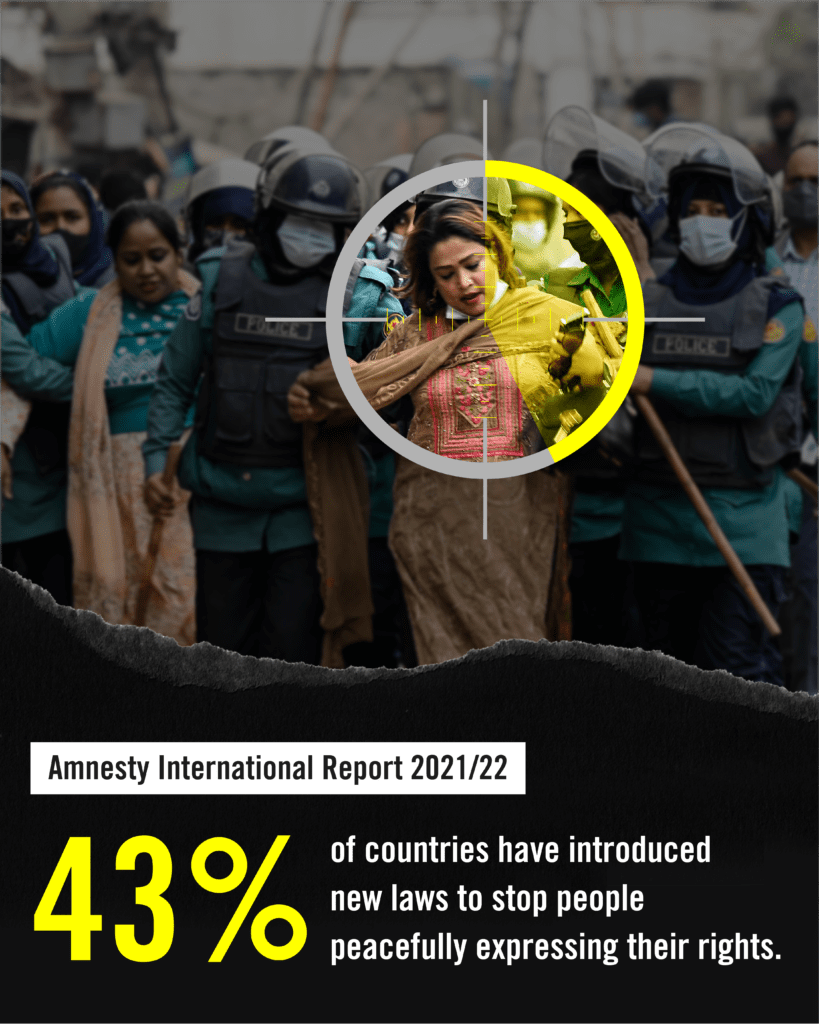
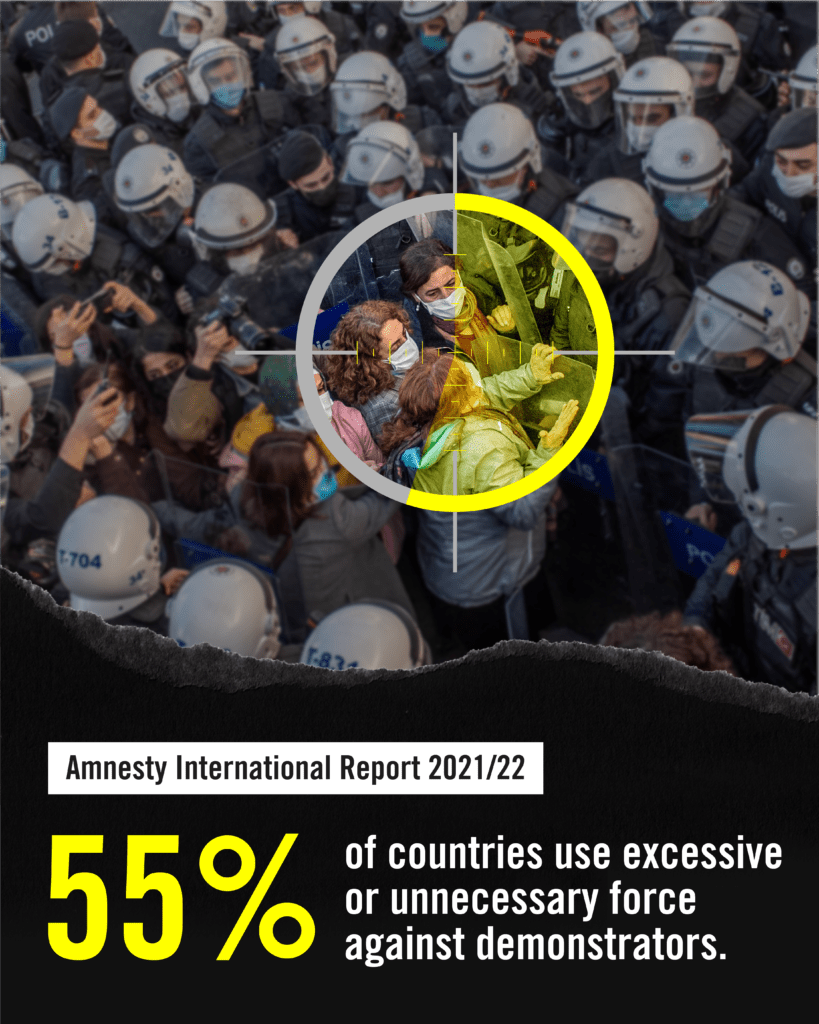
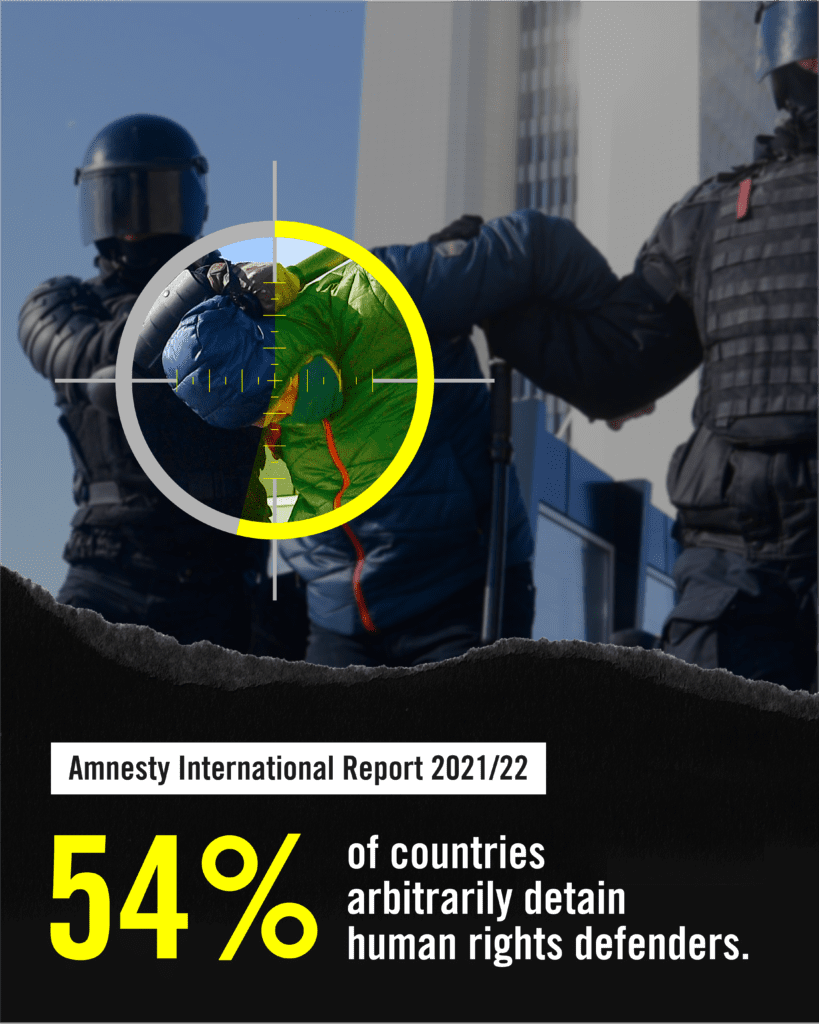
Global Analysis
Our global analysis of 2021 focuses on three themes: health and inequalities, civic space, and refugees and migrants.
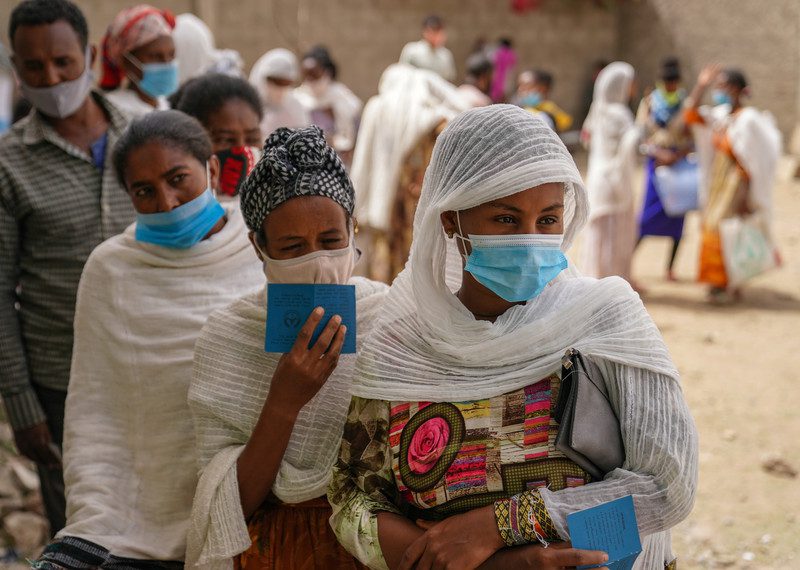
Health and inequalities
Vaccines provided hope for an eventual end to the pandemic, which, according to the World Health Organization (WHO) had claimed at least 5.5 million lives by the end of 2021, though some estimates suggest the actual number of deaths could be two to three times higher.
Many governments pledged to support global vaccination coverage, and the G7 and the G20 made notable commitments. However, despite efforts by some governments in the Global South in particular, international cooperation largely failed.
High-income countries stockpiled millions more doses than they could use, leaving some countries able to vaccinate their entire populations three to five times over.
Meanwhile, by the end of the year, less than 8% of Africa’s 1.2 billion people had been fully vaccinated, the lowest vaccination rate of any continent in the world and a far cry from the WHO’s 40% vaccination target by the end of 2021. Such global vaccine inequality further entrenched racial injustice.
Civic Space
Instead of providing room for discussion and debate on how best to meet the challenges of 2021, the continuing trend was for governments to suppress independent and critical voices, with some even using the pandemic as a pretext to shrink further the civic space.
During the year, many governments redoubled efforts to impose and/or implement repressive measures to target their critics, with many of these measures framed ostensibly to curb the spread of misinformation about Covid-19.
In China, Iran and beyond, authorities arrested and prosecuted individuals who criticized or challenged their Covid-19 responses. Across the globe, governments unduly prevented and dispersed peaceful protests, sometimes using the pretext of regulations to prevent the spread of Covid-19.
Several governments, notably in Africa, the Middle East and North Africa and Asia, blocked or heavily restricted access to the internet and social media.
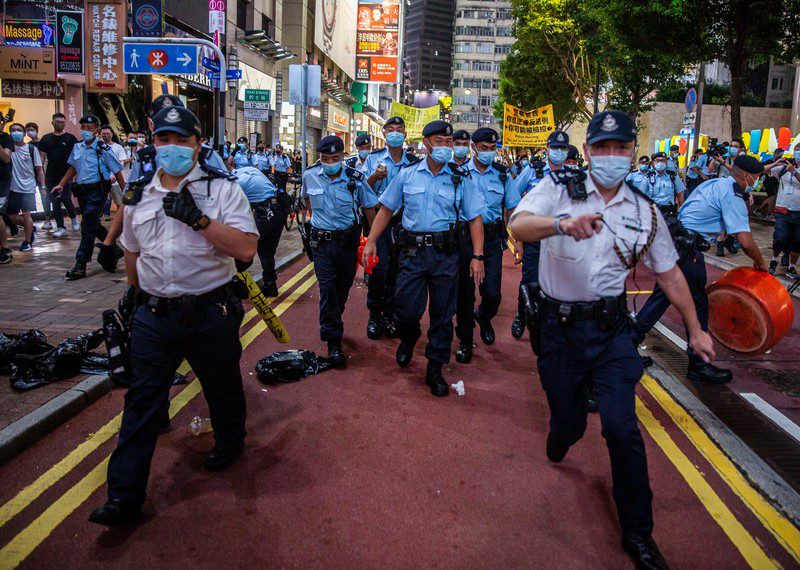
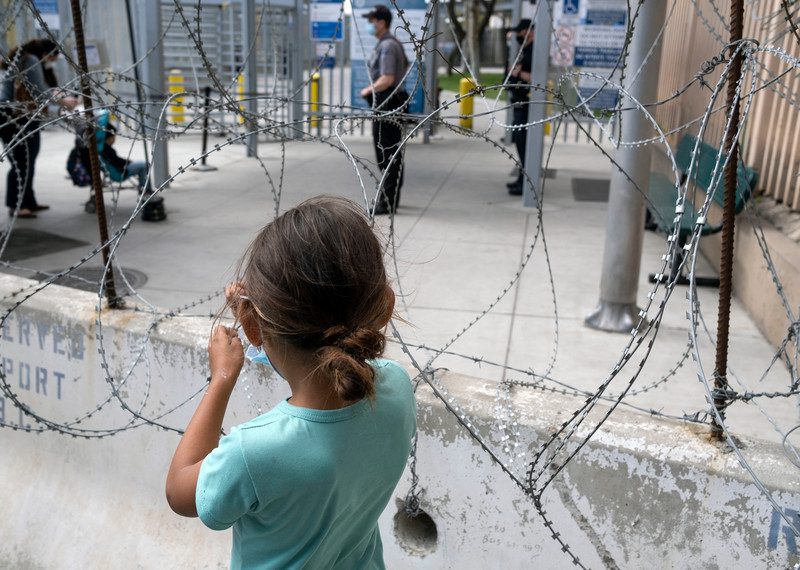
Global North pushback – refugees and migrants
There were unfolding mass displacements in 2021 caused by emerging and entrenched crises. Events in places such as Afghanistan, Ethiopia and Myanmar led to new waves of displacement.
Thousands continued to leave Venezuela and the ongoing conflict in the Democratic Republic of the Congo alone caused 1.5 million people to leave their homes in 2021. Globally, millions of people continued to flee their countries due to human rights violations related to conflict and violence, inequality, climate change and environmental degradation, with ethnic minorities among those most affected.
According to the UNHCR, the UN Refugee Agency, as of mid-2021 there were 26.6 million refugees and 4.4 million asylum seekers worldwide. The international community failed to provide adequate support and, worse, restricted access to safe havens. Too often, such people on the move were also subjected to a litany of abuses – and impunity reigned for patterns of widespread violations such as pushbacks, torture and sexual violence.
Timeline
The timeline highlights selected events from 2021 related to key human rights themes from the annual report’s preface and global analysis: health and inequalities, civic space, conflict, and refugees and migrants.
Case Studies
Amnesty International’s annual report covers widespread patterns of human rights violations in countries and regions, such as the lethal repression of protests. However, behind every human rights violation is a human story. One example among many is that of Kevin Agudelo, who was shot during a vigil for victims of police violence in Colombia and died.
Annual report regional content
The annual report’s five regional overviews cover not only the key themes prioritized in the preface and global analysis (health and inequalities, civic space, conflict, and refugees and migrants), but also other issues relevant to each region. Below are some key examples of these.

Impunity
In almost every country, perpetrators of crimes under international law, and other serious human rights violations and abuses, enjoyed impunity.

Right to education
School closures and other disruptions to learning due to the pandemic remained a major concern. In Chad, girls’ enrolment in secondary schools fell from 31% in 2017 to 12% in 2021 due to school closures and high rates of early and forced marriage. In South Africa, approximately 750,000 children had dropped out of school by May, over three times the pre- pandemic number of 230,000. In Uganda, where schools began a phased reopening in February but closed again in June, the National Planning Authority predicted that more than 30% of learners would not return to school. Children in conflict-affected countries experienced unique and profound difficulties in accessing education.

Right to housing
Despite the Covid-19 pandemic, forced evictions were recorded in several countries, leaving tens of thousands homeless. On a positive note, courts in Kenya and Uganda affirmed the right to housing and condemned forced evictions. The Supreme Court of Kenya ruled that the 2013 eviction of residents of City Carton, an informal settlement in Nairobi, the capital, violated their right to housing. The Constitutional Court of Uganda found that the Wildlife Authority had illegally evicted the Batwa Indigenous people from their ancestral land in the Mgahinga forest in the south-west.

LGBTI people’s rights
LGBTI people continued to face harassment, arrest and prosecution for their real or perceived sexual orientation or gender identity in many African countries. In Benin, three transgender women were forced to undress before being beaten and robbed by a group of men in Cotonou; the attack was filmed and shared on social media. Filmed attacks on LGBTI people were also common in Senegal. A new law in Nigeria contained a provision for life imprisonment for transgender people.
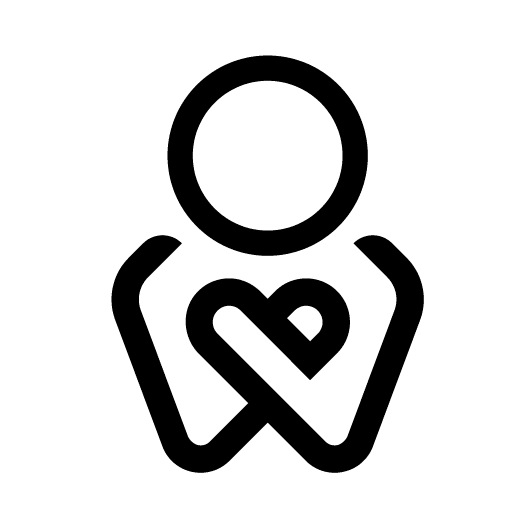
Sexual and reproductive rights
Many governments did not do enough to prioritize sexual and reproductive health. Essential services were lacking, and safe abortion services remained criminalized in most countries. The Dominican Republic, El Salvador, Haiti, Honduras, Jamaica and Nicaragua maintained total bans on abortion.
Despite Argentina’s landmark decriminalization and legalization of abortion within the first 14 weeks of pregnancy at the end of 2020, other countries failed to follow suit. In Chile, a bill decriminalizing abortion within the first 14 weeks of pregnancy was rejected.

Indigenous people’s rights
Indigenous peoples in the Americas continued to face inadequate access to their rights to water, sanitation, health and social protection, as well as a lack of culturally appropriate mechanisms to protect their rights to health and livelihoods – all of which exacerbated the impact of the Covid-19 pandemic

Violence against women and girls
Measures to protect women and girls were inadequate throughout the region and investigations into cases of gender-based violence were often flawed. In Mexico, for example, violence against women continued to be widespread. There were 3,427 killings of women registered during the year, of which 887 were under investigation as femicides. In Colombia, where the Colombian Femicide Observatory reported 432 femicides in the first eight months of the year, security forces also regularly committed acts of sexual violence against women. Both Paraguay and Puerto Rico declared states of emergency because of increased violence against women. There were also significant increases in violence against women in Peru and Uruguay.

LGBTI people’s rights
The Americas saw some limited progress in the recognition of the rights of LGBTI people – but overall legislation was blocked and LGBTI people continued to be the targets of discrimination, violence and killings in several countries. Argentina introduced new identity cards recognizing people who identify as non-binary, and in June Congress passed a law to promote the employment of trans people. In the USA, the Biden administration took steps to repeal the previous administration’s discriminatory policies toward LGBTI people. Nonetheless, hundreds of state-level bills were also introduced that would curtail the rights of LGBTI people.
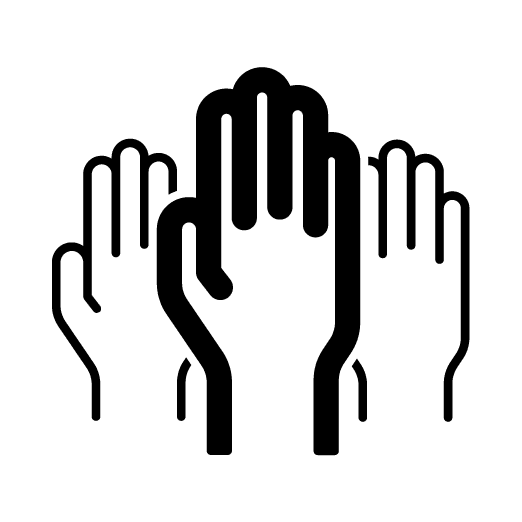
Workers’ rights
The pandemic continued to place enormous strain on health workers across the region. In many countries they worked in intolerable conditions without adequate protection or remuneration. In Mongolia, health workers were subjected to harassment by the authorities and physical assaults by frustrated and desperate patients. In India, community health workers were not given adequate wages or PPE. In Indonesia, disbursement of incentive payments to health workers in recognition of their work during the Covid-19 pandemic were delayed. The socio-economic impacts of the pandemic and associated restrictions also continued to bite – disproportionality impacting those who were already marginalized, including people who lacked secure employment and regular incomes.

Women’s and girls’ rights
There were major setbacks to the rights of women and girls in the region. In Afghanistan, 20 years of progress towards enhanced protection and promotion of women’s rights was rolled back overnight. Sexual and gender-based violence, already endemic in many countries of the region, was exacerbated in the context of states’ responses to Covid-19. Demands for accountability for violence against women and stronger protections made little headway. The Chinese government conducted a smear campaign against exiled women formerly detained in the Xinjiang region who spoke out about sexual violence in so-called “re-education centres”. In Pakistan, a domestic violence bill was passed by parliament but opposition from conservative parties reportedly led the government to request a religious advisory body to review it.

LGBTI people’s rights
LGBTI people continued to be persecuted or otherwise face discrimination in law and practice in many countries in the region. Consensual same-sex sexual relations remained criminalized in some countries. Anti-LGBTI campaigns were waged in several countries. In Malaysia over 1,700 people were sent to government-run rehabilitation camps designed to change the “lifestyle” and “sexual orientation” of LGBTI people. Chinese authorities continued their campaign to “clean” the internet of LGBTI representation. Effeminate looking men were banned from appearing on television and the social media accounts of LGBTI organizations shut down. In Afghanistan, the Taliban made it clear that they would not respect LGBTI rights. Small advances were made in the recognition of same-sex marriages in Taiwan, but LGBTI people continued to face discrimination.

Torture and other ill-treatment
Limited progress was made on preventing torture and other forms of ill-treatment which remained pervasive in a significant number of countries in the region. There were moves in both Pakistan and Thailand to criminalize torture. However, proposed legislation in the latter was not fully consistent with international standards. In Sri Lanka, new regulations issued under the Prevention of Terrorism Act potentially placed detainees at increased risk of torture. Torture and ill-treatment continued to be reported in these and other countries.

Erosion of judicial independence
One key feature of state overreach was the erosion of judicial independence. Poland continued its defiance of attempts by European organizations to halt the destruction of the independence of the country’s judiciary, confronting the EU with its greatest rule of law crisis to date. The situation was worse in Belarus, where authorities weaponized the justice system to punish victims of torture and witnesses of human rights violations. In Georgia, the arrest and degrading treatment in detention of prominent opposition leaders including former president Mikheil Saakashvili raised concerns about judicial independence. Multilateral organizations noted that a new constitution in Kyrgyzstan could encroach upon judicial independence.

Discrimination
Racism and discrimination against Black people, Muslims, Roma and Jewish people became more overt in many contexts. In the UK, a government report dismissed concerns about institutional racism, while a new police bill augured more discrimination against Black, Gypsy, Roma and Traveller communities. The Danish authorities removed references to “ghettos” from legislation, but continued to enforce social housing limits on residents of “non-Western background.” In moves justified to counter radicalization and terrorism, Austria and France stepped up surveillance of Muslim communities, raided mosques and/or shut down organizations monitoring Islamophobia. In Germany, there were 1,850 antisemitism and other hate crimes against Jewish people officially reported up to 5 November 2021 – the highest number since 2018 – while steep spikes in reported similar incidents were also recorded in, Austria, France, Italy and the UK.

Sexual and reproductive rights
Access to safe and legal abortion continued to be a central human rights issue in several countries. Rights were rolled back in Andorra, Malta, Poland and elsewhere. In Poland a Constitutional Tribunal ruling that abortion on the ground of serious fetal impairment was unconstitutional entered into force. In the year following the ruling, 34,000 women contacted the NGO Abortion without Borders, which facilitates travel abroad for abortion care and advice. In Andorra defamation charges remained ongoing against a defender who had raised concerns about the country’s total ban on abortion before the UN. In a positive development, a popular vote in San Marino legalized abortion.

Violence against women
The picture remained mixed with regard to violence against women. While Turkey withdrew from a landmark treaty on combating violence against women, the Istanbul Convention, Moldova and Liechtenstein both ratified it. Further, Slovenia reformed its rape law to make it consent-based, and rape legislation reforms were also underway in the Netherlands, Spain and Switzerland. Violence against women remained widespread, however. The Russian Women’s NGO Consortium found that 66% of women murdered from 2011-2019 had been victims of domestic violence. Uzbekistan’s interior ministry rejected a request from the NGO NeMolchi about prosecutions for violence against women, stating it was “to no purpose”. In Azerbaijan women’s rights activists and journalists were blackmailed and subjected to gender specific smear campaigns, while women’s rallies on domestic violence were violently dispersed. In Ukraine homophobic attacks continued and there were reports of lack of services for survivors of domestic violence in the non-government controlled areas of Donbas.

Torture and other ill treatment
Torture and other ill-treatment in official and unofficial places of detention continued in at least 18 countries, including during interrogation to extract “confessions” and indefinite solitary confinement in dire conditions. Authorities in Egypt, Iran, Libya and Saudi Arabia failed to carry out investigations into the causes and circumstances of suspicious deaths in custody following reports of torture, including deliberate denial of healthcare. In Lebanon 26 cases were reported of Syrian refugees, including four children, held on terrorism-related charges, facing torture by military intelligence officers and others. The authorities failed to investigate the torture claims even when detainees told the court they had been tortured. Prominent political critic Nizar Banat died in the custody of Palestinian Preventive Security forces after they arrested and tortured him in Hebron, southern West Bank. An autopsy found fractures, bruises and abrasions all over his body.

Workers’ rights
Authorities across the region failed to protect low-paid workers from job or wage loss, including as a result of the economic impact of the pandemic. Governments also repressed workers’ right to strike and failed to protect workers unfairly dismissed for participating in strikes. In Egypt, authorities continued to penalize workers for expressing their opinions or for their alleged dissent. New legislation allowed for the automatic dismissal of public sector employees on the “list of terrorists”, while a court sanctioned the dismissal without compensation of a public sector company worker for “publicly expressing his political opinions”. However, reforms to improve protection for migrant workers were announced in several countries, particularly in the Gulf, where they make up a very high proportion of the workforce.

Women’s and girls’ rights
Across the region, violence against women and girls went mostly unpunished by criminal justice systems. So-called “honour” killings continued to take place in Jordan, Iraq, Kuwait and in Palestine with the authorities failing to take action to prosecute the perpetrators. Proposed legislation on addressing violence against women in Iran contained some welcome provisions including on the establishment of safe houses, but failed to define domestic violence as a separate offence, criminalize marital rape and child marriage, and favoured reconciliation over accountability in cases of domestic violence. Additional legislative changes in Iran further undermined women’s reproductive rights, severely restricting access to contraception, voluntary sterilization services and related information. In Libya, authorities failed to provide protection or redress for women and girls from rape and other sexual and gender-based violence as well as killings, torture and unlawful deprivation of liberty by militias, armed groups, and other non-state actors.

Religious and ethnic minorities
Across the region, members of religious minorities faced entrenched discrimination in law and practice including in their right to worship. In some countries, including Egypt and Iran, members of religious minorities and individuals born to parents identified as Muslim by authorities were arrested, prosecuted and arbitrarily detained for professing their faith or expressing non-sanctioned beliefs. In Iran, three Christian converts were sentenced to imprisonment on the basis of new legislation prescribing up to five years’ imprisonment for insulting “divine religions” or for engaging “in proselytizing”. Ethnic minorities in Iran and Libya faced discrimination curtailing their access to employment, political office and essential services including education and healthcare, and violating their linguistic and cultural rights. In Iran, ethnic minorities remained disproportionately affected by death sentences imposed for vaguely worded charges such as “enmity against God”.
Calls for action
In order to fulfil their promises, governments and institutions should build their pandemic recovery and crisis response firmly on a human rights framework, and facilitate real dialogue with civil society as partners in reaching solutions.
Amnesty International’s annual report sets out a series of recommendations for governments and other bodies on the themes prioritized in its global analysis – health and inequalities, civic space, and refugees and migrants – as well as other themes addressed in its five regional overviews.
The Amnesty annual report helps to inform advocacy work with governments across the world throughout the year.

